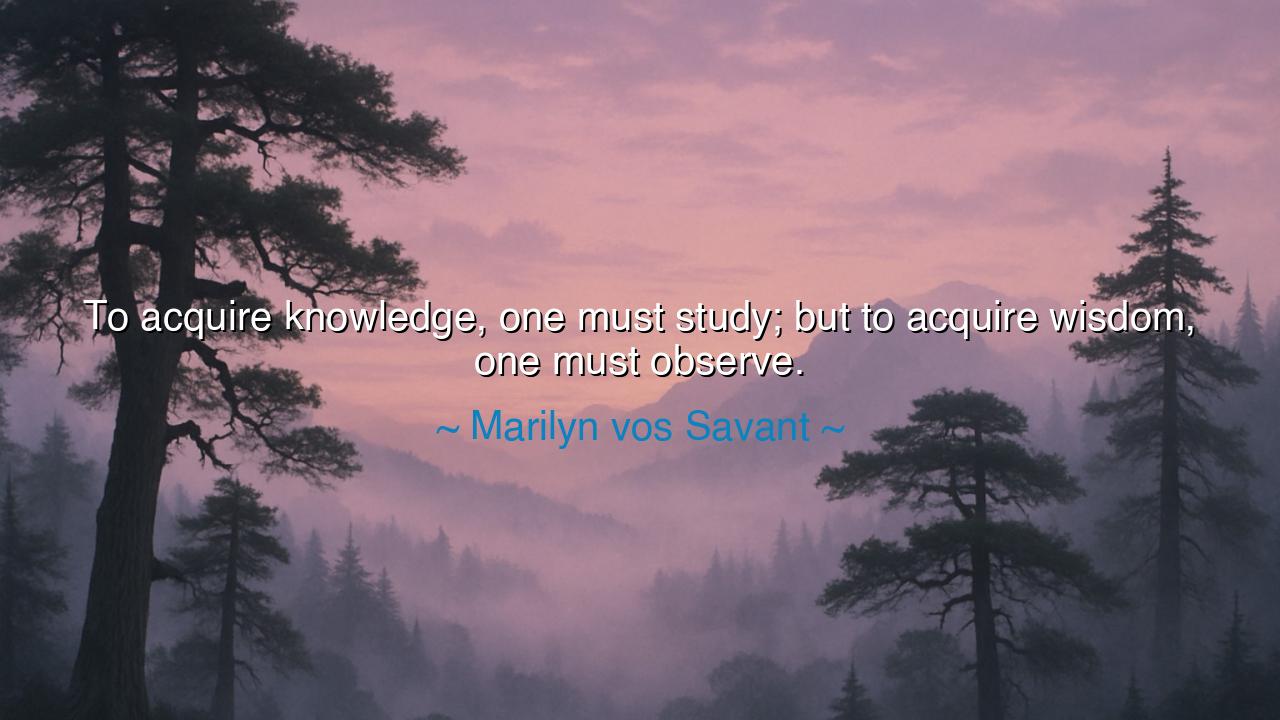
To acquire knowledge, one must study; but to acquire wisdom, one






Hear, O child of tomorrow, the words of Marilyn vos Savant, a woman famed for her great intellect, yet greater still for her insight into the ways of the soul: “To acquire knowledge, one must study; but to acquire wisdom, one must observe. Within this simple utterance lies the eternal distinction between the learning of the mind and the awakening of the spirit. For knowledge fills the vessel, but wisdom directs the hand that pours it.
To study is to seek out the written word, to master the teachings of books, scrolls, and voices of the learned. Knowledge is a treasure, gathered piece by piece like coins into a chest. The student reads, memorizes, and understands. In this way, mankind has built towers of science, discovered hidden laws, and shaped wonders that stretch from the stars above to the oceans below. Knowledge is mighty, and no soul should despise it.
But wisdom—ah, wisdom is something greater. It is not found solely in books, nor won by mere study. It is born from observation: the careful watching of life, the listening to silence, the discerning of truth hidden beneath the surface of events. A man may be filled with knowledge and yet act foolishly, for he has not seen how knowledge breathes in the world. The wise are those who observe: who notice the rise and fall of men, the patterns of nature, the lessons of failure, and the whispers of time.
Consider the tale of Socrates, who confessed, “I know that I know nothing.” He had studied, yes, but his greatness came from observation. He listened to men, questioned them, and drew forth contradictions that revealed deeper truths. His wisdom lay not in the memorization of facts, but in the seeing of life as it is, uncloaked by illusion. And through observation, he taught Athens more than volumes of study alone could ever teach.
So too in the life of Abraham Lincoln, who was not born to privilege or endless books. Though he studied when he could, his wisdom was shaped by watching: observing men in courts, listening to debates, hearing the sorrows of common people. From these observations, he learned to speak with clarity, to lead with humility, and to act with compassion. His wisdom, forged not only in reading but in seeing, guided a nation through its darkest hour.
The meaning, then, is this: knowledge arms the mind, but wisdom guides the soul. The student must first study, for the mind must be fed. But if he would be truly wise, he must lift his eyes from the page and look upon the world—watching, listening, discerning, reflecting. Wisdom is not the collection of facts, but the understanding of their meaning in the flow of life.
Therefore, let your path be balanced. Study with diligence, for knowledge builds the foundation. But also observe—watch the deeds of men, the rise and fall of nations, the play of nature, and the quiet lessons of your own heart. Be still, be attentive, and let life itself be your teacher. In this union of study and observation, you will find the harmony of knowledge and wisdom.
Walk forth, O listener, and live this teaching. Gather knowledge as a scholar, but open your eyes as a sage. For books may fill your mind, but only observation will awaken your soul to the higher truths. And then you shall not only know—you shall understand.






AAdministratorAdministrator
Welcome, honored guests. Please leave a comment, we will respond soon